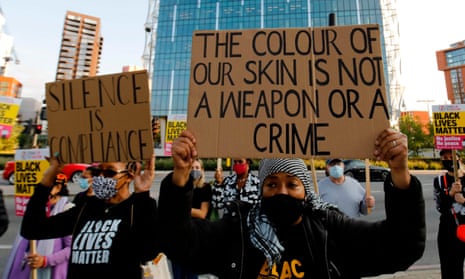Equality campaigners have said they do not have confidence in the UK government’s Commission on Race and Ethnic Disparities to deliver changes needed by black, Asian and other minority ethnic communities.
Responding to the commission’s call for evidence, which ends at 11.45pm on Monday, the Coalition of Race Equality organisations (Core) expressed fears that the commission may be a fig leaf for inaction.
In its submission, Core, whose members include Runnymede Trust, Race on the Agenda and Operation Black Vote, states: “In the past, public inquiries and commissions have failed to result in any real systemic change for BME [black and minority ethnic] communities.
“We have raised our concerns from the outset of this commission that it must show a commitment to address issues of structural and systemic racism and should not act as a tool to distract the public from inaction on race equality.”
The commission was set up in response to Black Lives Matters protests but prompted questions as to whether another review was necessary.
Core’s submission says the implementation of recommendations from the McGregor-Smith report into race in the workplace, the Lammy review into bias in the criminal justice system, the Angiolini review into deaths in custody and advancing the rights of GRT (Gypsy, Roma, Traveller) communities would have been a better use of resources.
On announcing the commission, Boris Johnson came in for criticism for saying he wanted to end “the sense of victimisation”. The head of his policy unit, Munira Mirza, who has previously criticised the concept of structural racism, was given the job of setting up the panel. The appointment of Tony Sewell to chair the commission has generated controversy because he has previously warned against the sense of “victimhood” that he believes is engendered by the notion of institutional racism.
The Core submission states: “The government has failed to listen to our concerns about the commission’s terms of reference, its make-up and chair, or our calls to concentrate on issues of structural and systemic racism.”
Despite its reservations, Core has submitted a wide range of suggested solutions to ethnic disparities, covering health, education, crime and policing, economic inequality, democracy and the problems faced by GRT communities,
They include everything from abolishing no recourse to public funds to broadening the national curriculum and scrapping section 163 of the Road Traffic Act, which allows police to stop any vehicle without reason.
A government spokesperson said: “We are confident that the work of the commission will have a positive impact on this country. While a great deal has been learnt from previous reviews, this is the first work of its kind commissioned by the current administration.
“To criticise the work of the commission without any knowledge of what it might find is incredibly counter-productive, particularly when individual Coalition on Race Equality organisations have already engaged with its work.”
